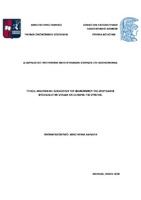Ανάλυση και αξιολόγηση του φαινομένου της ενεργειακής φτώχειας στην Ελλάδα και σε χώρες της Ευρώπης
Analysis and evaluation of the effect of energy poverty in Greece and the European Union

Προβολή/
Λέξεις κλειδιά
Βιοκαύσιμα ; Βιοοικονομία ; Ανανεώσιμες πηγές ενέργειας ; Βιωσιμότητα ; Ενεργειακή φτώχειαΠερίληψη
Η ενέργεια είναι ένας από τους μεγάλους τομείς που ασχολείται η βιοοικονομία και ένας από τους δεκαεφτά στόχους της βιώσιμης ανάπτυξης του ΟΗΕ. Συγκεκριμένα, ο έβδομος στόχος που αναφέρεται στην φθηνή και καθαρή ενέργεια. Η πρόσβαση στην ενέργεια είναι αναγκαία για όλο τον κόσμο, λόγω των ευκαιριών που προκύπτουν, είτε πρόκειται για θέσεις εργασίας, την κλιματική αλλαγή, τις παραγωγικές διαδικασίες ή την αύξηση των εισοδημάτων. Η βιώσιμη ενέργεια είναι μία ευκαιρία για να μεταμορφωθεί η οικονομία, ο πλανήτης και οι ζωές. Επομένως το φαινόμενο της ενεργειακής φτώχειας δυσκολεύει την επίτευξη του στόχου καθώς οι άνθρωποι που την αντιμετωπίζουν βρίσκονται μακριά από το βιώσιμο επίπεδο, ως προς την κάλυψη των αναγκών ενέργειας. Οπότε με τη έρευνα, θα είναι πιο εύκολο να προσδιοριστεί και να υπολογιστεί το φαινόμενο της ενεργειακής φτώχειας έτσι ώστε οι πολιτικές που θα προταθούν, θα βοηθήσουν στην μείωσή του.
Η ενεργειακή φτώχεια ή πενία είναι ένα παγκόσμιο πρόβλημα της εποχής μας καθώς έχει πλήξει πολλά νοικοκυριά σε όλες τις χώρες ανεξάρτητα της ανάπτυξης που έχουν. Μαζί με την τεράστια οικονομική ύφεση το 2010 λόγω μείωσης του ΑΕΠ μελετήθηκε το πρόβλημα και προτάθηκαν μέτρα εξυγίανσης από του ειδικούς της ΕΕ καθώς όπως προανέφερα δεν παρουσιάστηκε μόνο στην Ελλάδα αλλά σε όλο τον κόσμο.
Στόχος της διπλωματικής αυτής είναι η μελέτη και η αξιολόγηση του φαινομένου καθώς και ο εντοπισμός των παραγόντων που το επηρεάζουν. Για το σκοπό αυτό διενεργήθηκε οικονομετρική έρευνα με βάση στοιχεία από την παγκόσμια βάση δεδομένων που είναι καταχωρημένες οι τιμές σχετικά με εισοδηματικά, δημογραφικά και περιβαλλοντικά χαρακτηριστικά κάθε χώρας. Επιπλέον, παρουσιάζονται σύνθετοι δείκτες που μετρούν την ενεργειακή φτώχεια και μας βοηθούν στην παρουσίαση των αποτελεσμάτων.
Πιο συγκεκριμένα η μελέτη αφορά χώρες της Ευρώπης στο διάστημα εννέα ετών (από το 1998-2014 ανά διετία) . Παρουσιάζεται μια σύγκριση για τις χώρες βασισμένη στα αποτελέσματα της έρευνας ως προς την κατανάλωση ενέργειας και των πηγών προέλευσής της . Θα ακολουθήσει η παρουσίαση του οικονομετρικού υποδείγματος, βάση του οποίου προκύπτουν τα συμπεράσματα για τις σχέσεις εξάρτησης ανάμεσα στην ενεργειακή φτώχεια, το κατά κεφαλήν εισόδημα, τις εκπομπές CO2, την τιμή του πετρελαίου και των υπόλοιπων μεταβλητών που έχουν μετρηθεί και αξιολογηθεί.
Τέλος, με την απομόνωση και την μελέτη στη συμπεριφορική δράση των παραγόντων, θα βοηθηθούν πιθανές πολιτικές να εφαρμοστούν με επιτυχία. Επομένως, με τη γνώση σχετικά με το πως θα αντιδράσει η ενεργειακή πενία σε μία μεταβολή για παράδειγμα του εισοδήματος (που είναι ένας από τους βασικούς και πρωταρχικούς παράγοντες της μελέτης), θα προκύψουν παράμετροι που θα βοηθήσουν στην λήψη αποτελεσματικότερων μέτρων μείωσης του φαινομένου. Όπως άλλωστε φάνηκε χρήσιμες πολιτικές και πιο αποτελεσματικές είναι εκείνες που έχουν κάποιο αντίκτυπο στην προστασία του περιβάλλοντος.


